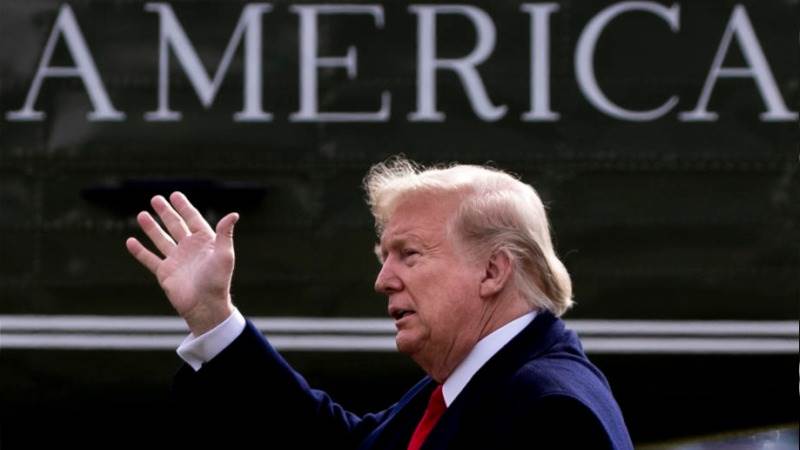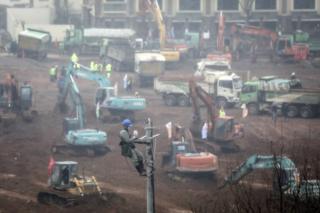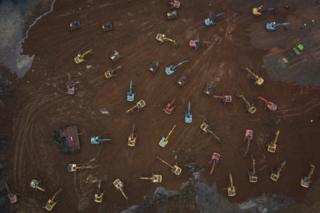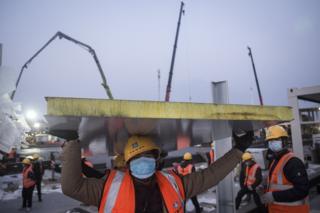MADRID/SEOUL (Reuters) – The air transport sector, already reeling from China passenger flight cancellations designed to slow the spread of coronavirus, now faces mounting freight and logistics disruption with broader repercussions at stake, economists warn. The thousands of dropped flights have already slashed “belly cargo” capacity in airliner holds, with operators like Lufthansa (LHAG.DE) also scaling back freighter services in response to crew health concerns and uncertain demand. The crisis has dimmed hopes of a rebound for air cargo after its worst year in the decade since the financial crisis, the International Air Transport Association, a group of 280 global airlines, said on Wednesday. Air cargo is widely seen as an early warning system for blips in global trade and business confidence that would not otherwise be easily visible for weeks or months. “We are in unknown territory with respect to the eventual impact of the coronavirus on the global economy,” IATA said. “With all the restrictions being put in place, it will certainly be a drag on economic growth.” Early victims of supply-chain breakdowns include Hyundai Motor Co. (005380.KS), forced to halt South Korean car production as flows of Chinese components dried up. But with manufacturing paused for the Chinese New Year – and planned stoppages at Airbus AIR.FR and elsewhere now being extended – it may be weeks before economies feel the full brunt of the freight upheaval currently playing out. As things stand, “many supply chains are essentially halted, so there’s nothing to transport,” Bernstein analyst Daniel Roeska said. “If you’re ordering people to stay in their houses it’s difficult to keep factories running.” Yet when output and freight demand pick up, operators once blighted by excess capacity may have the opposite problem, with sudden bottlenecks threatening customers and the wider economy. This week will see 25,000 fewer flights operated to, from and within China than a fortnight ago, aviation data firm OAG said, with services suspended by 30 airlines.
Some firms seeking to fly goods out of China are already finding prices prohibitive. One Shanghai-based e-commerce consultant told Reuters certain clients had delayed shipments after quoted cargo rates rose fivefold.
Freight forwarders are warning of “increased rate volatility for air freight, due to reduced belly cargo capacity,” according to Panjiva, the supply-chain research unit of S&P Global Market Intelligence. Air cargo represents less than 1% of global trade by tonnage but 35% by value, or about $6 trillion a year, Boeing says. In normal times about half that volume is carried in passenger jet holds, leaving China more dependent on freighter operations in the wake of the flight suspensions. Major air cargo carriers said they had no immediate plans to add China freighter services to replace the lost capacity. Korean Air Lines Co Ltd (003490.KS) and Japan’s ANA Holdings Inc (9202.T) both said higher China-bound shipments of medical supplies including masks had partially offset a decline in fresh food such as lobster and salmon and other goods. Germany’s Lufthansa said it had cut its freighter schedule to allow pilots to spend the night in Russia rather than China. The reduction also reflects lower demand, a spokesman said. Repercussions could be worsened by marine shipping cuts, S&P said – with Maersk, CMA-CGM and ONE among container lines that have discussed reducing Asia-Europe capacity. Delays to surface shipping may cause pockets of air freight demand as suppliers re-route goods to avoid delay penalties. “One of our customers is moving a shipment to air freight because they do need goods before the intended arrival date,” said Ben Bradley, a rail operator at Davies Turner in Britain.He was referring to the cancellation of a Feb. 15 rail shipment to London from Wuhan, the city at the center of the outbreak. Once Chinese production recovers, dedicated cargo carriers like United Parcel Service Inc (UPS.N), FedEx Corp (FDX.N) and DHL stand to benefit most, said Cowen analyst Helane Becker.





